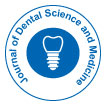开放获取期刊获得更多读者和引用
700 种期刊 和 15,000,000 名读者 每份期刊 获得 25,000 多名读者
抽象的
Comparison of intra-socket bupivacaine administration versus oral mefenamic acid capsule for postoperative pain management following removal of impacted mandibular third molars
Ideh Talimkhani
Purpose: Surgical removal of impacted third molar teeth is one of the most common surgical procedures performed in oral and maxillofacial surgery. Postoperative pain is a common and predictable occurrence after maxillofacial surgery.
Materials: and Methods: This randomized double-blind clinical trial was conducted with a crossover design in which each patient served as his or her own control. Forty-six patients with similar bilateral impacted lower third molars were selected. In each patient, the intervention and control sides of the mandible were randomly determined at the end of surgery. If the removed tooth was on the intervention side, then the patient would receive bupivacaine and a placebo of mefenamic acid. If the impacted tooth was on the control side, then the patient would receive a mefenamic acid capsule and a placebo of bupivacaine. Pain severity was assessed using a visual analog scale. Data were analyzed using a paired-sample t-test and a P value less than .05 was considered statistically significant.
Results: Of 46 participants originally recruited, 43 were included in the present study. The mean postoperative pain score in patients who received bupivacaine was increased to a maximum of 4 hours, with marked improvements after this time. The mean intensity of pain after administration of bupivacaine was lower than that of mefenamic acid capsules at different time points. Statistical analysis showed a relevant difference in pain intensity between the 2 study groups.
Conclusion: The results of the present study showed that local administration of bupivacaine relieves postoperative pain after surgical removal of impacted third molar teeth

 English
English  Spanish
Spanish  Russian
Russian  German
German  French
French  Japanese
Japanese  Portuguese
Portuguese  Hindi
Hindi